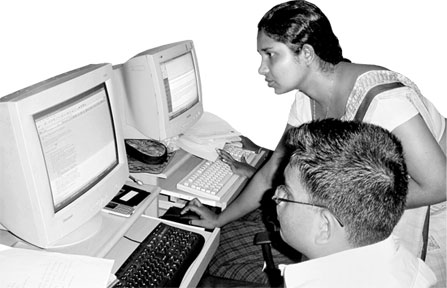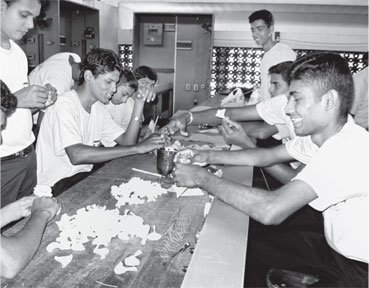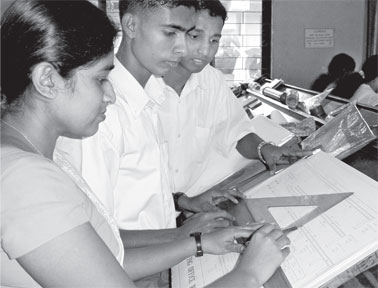|
To face future challenges:
Develop a qualified workforce
by Lionel WIJESIRI
 Any right thinking person will agree with Youth Affairs and Skills
Development Minister Dullas Alahapperuma on his recent comments in the
Sunday Observer that our education and political system had focused
attention only on university education and that this was one of the
biggest mistakes in our history. Any right thinking person will agree with Youth Affairs and Skills
Development Minister Dullas Alahapperuma on his recent comments in the
Sunday Observer that our education and political system had focused
attention only on university education and that this was one of the
biggest mistakes in our history.
As a result, he said, white collar jobs were highly recognised while
other jobs were undermined. President Mahinda Rajapaksa and the
Government intend to correct this anomaly and produce a skilled youth
force before long, he said.
It is an axiom that in the past 50 years, economies around the world
have seen rapid changes.
The role of technology has altered and grown, the scope and nature of
available employment have altered, and international competition has
increased. Many countries have also faced significant changes to their
political circumstances. Sri Lanka has experienced both kinds of change.
When such changes take place in a country's economic and political
spheres, the national education and training system needs to respond
quickly and flexibly to these emerging needs. It needs to retrain and
re-educate individuals to face the new challenges.
The system also needs to recognise previous experience, so that
re-training and re-education can build on the learning that this has
given rise to.
Challenges
 |

Students undergo vocational training
|
The present Government, as Minister Alahapperuma says, views the
system of vocational education, training and qualifications as crucial
in preparing individuals to meet the challenges of the future. In the
early 90s, when President Rajapaksa held the portfolio of vocational
training, he presented the Vocational Training Authority Bill with a
program with radical changes to the training system. He took tertiary
training to rural areas as well.
The program was expected to ensure that the changes could improve the
quantity and quality of learning opportunities and make learning more
relevant to employment needs.
The system was also designed to make it easy to respond to changes in
requirements, the idea being that it would be easy to re-combine
existing standards, update existing standards or to create new standards
where these were components of qualifications.
Vocational qualifications
Let us consider the qualifications that make up our national system
of vocational qualifications.
There are various government institutions under the Ministry of
Vocational and Technical Education offering various training programs:
TVEC, HRDC, NITE, DTET, VTA, NAITA, CITA, INGRIN Institute of Printing,
NIBM, CGTTI, HRDC and CITI.
Several national vocational qualification courses are conducted by
the Vocational Training Authority. There are seven levels of
qualifications from Level 1 to Level 7. The National Certificate for
Level 1 recognises the acquisition of a core of entry level skills.
National Certificates for Levels 2, 3 and 4 recognise increasing levels
of competencies. Level 4 awards qualifications for full national
craftsmanship. Levels 5 and 6 are a national diploma and recognise the
increasing levels of competencies ranging from technical level to
management level. Level 7 is a Bachelors Degree or equivalent. There are
37 technical colleges in Sri Lanka. These institutions are managed by
the Department of Technical Education and Training which functions under
the Ministry of Skills Development, Vocational and Technical Education.
They offer national certificates and advanced diplomas in engineering
technician, engineering craft and business studies.
The Sri Lanka Institute of Advanced Technical Education (SLIATE) has
an Advanced Technical Institute in every province for Engineering and
Business Studies. At present it manages and supervises 10 separate
Advanced Technical Institutes and seven sections housed in the technical
colleges under the Department of Technical Education and Training to
conduct higher national diplomas and national diplomas.
There are a number of other career options: for example, German
Technical Training Institute, Moratuwa, National Institute of Business
Management (NIBM), Sri Lanka School of Agriculture, Sri Lanka Law
College, Sir John Kotelawala Defence University Academy and the Open
University of Sri Lanka.
It is obvious that we have a reasonably wide spectrum of vocational
education and training facilities for the youth. So, what has gone
wrong? Why did we fail to develop the requisite number of qualified
mid-level and low-level technical and vocational personnel?
NQF
We urgently need to do a proper evaluation of the purposes of these
qualifications, the nature of a standards-based approach to
qualifications, and issues affecting their design.
Such an evaluation, I believe, will reveal the necessity of a
National Qualifications Framework (NQF) in Sri Lanka designed to cover
all national qualifications.
The aim is to apply the framework to all qualifications and stress
that the true test of value is whether the qualification is fit for its
purpose. Eventually, it will reduce the importance of labels such as
"vocational" and "academic".
Although this article focuses on technical and vocational
qualifications, much of the content could be applied to other
qualifications as well.
A NQF should be the national policy for regulated qualifications in
Sri Lankan education and training.
It should incorporate the qualifications from each education and
training sector into a single comprehensive national qualifications
framework. It will underpin the national system of qualifications in Sri
Lanka, encompassing higher education, vocational education, training and
schools.
The users of the NQF can span each education and training sector:
schools, vocational education and training and higher education and
include the accrediting authorities and institutions providing education
and training.
The many NQF stakeholders will include industry and its
representative bodies, unions, professional associations and licensing
authorities and governments.
Ultimately students, graduates and employers, both local and
international, benefit from the quality qualifications that are built on
the requirements of the NQF. The NQF will accommodate the diversity of
purposes of Sri Lankan education and training now and into the future.
It will also support individuals' lifelong learning goals by
providing the basis to progress through education and training and gain
recognition.
Prerequisites
An analysis of Sri Lanka's system of qualifications will disclose
that there are four significant prerequisites for the development of a
national system of qualifications. These are planning, provision,
assessment and recognition and analysis of management institutions and
processes. Planning means identification of the qualifications needed
for the country's economy and foreseeing the future trends by
continuously studying the labour market.
Provision means the training and studies processes performed at
recognised educational institutions as well as the non-formal
self-contained learning processes.
Assessment and recognition mean appraisal of the competencies
acquired in the education system and labour market, granting official
recognition of the acquired qualification by certificates, diplomas and
other documents. The management means the arrangement and supervision of
the system of qualifications processes, performed by recognised State
institutions and accredited institutes. All of the above facts imply
that the development of an essentially new national system of
qualifications must be based on the analysis of not only the present
situation of institutions and the processes, but also their development.
With the introduction of a proper NQF, we can look forward to moving
away from the concept of competencies that are created solely within the
education system. The focus will automatically divert to a greater
extent on what a person can do rather than what he or she has in the
form of certifications.
|

